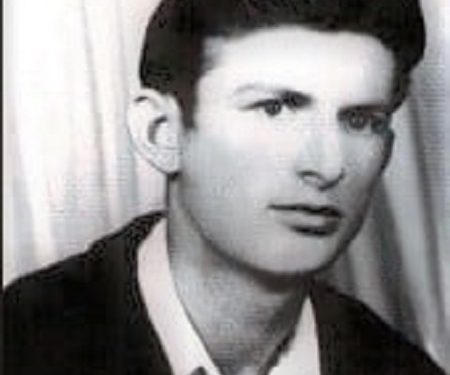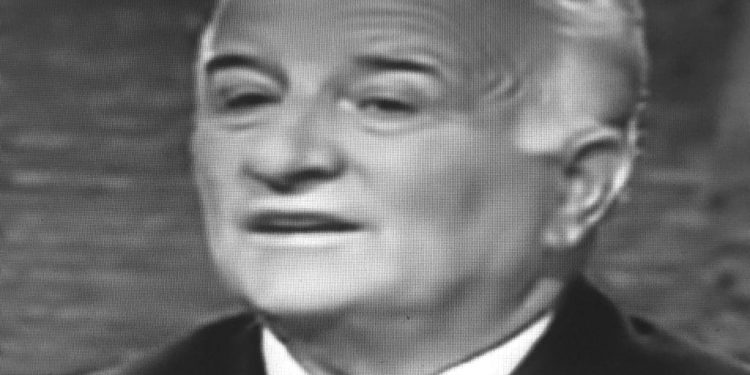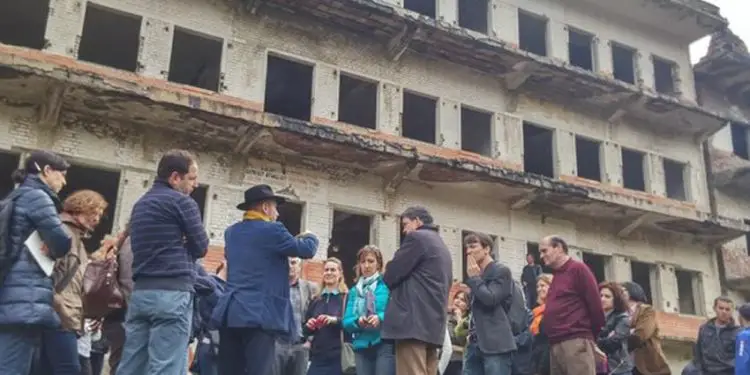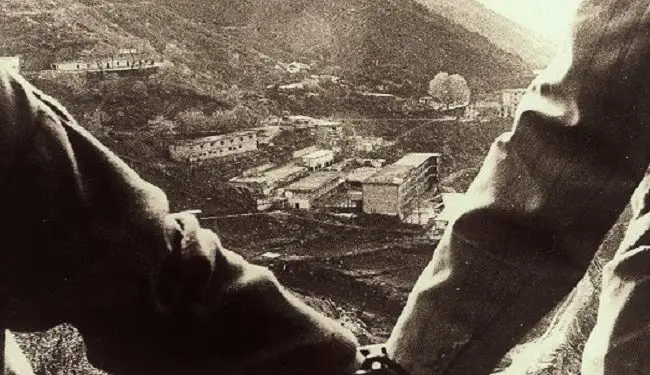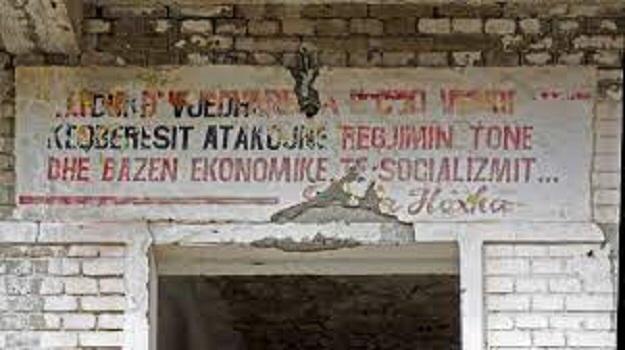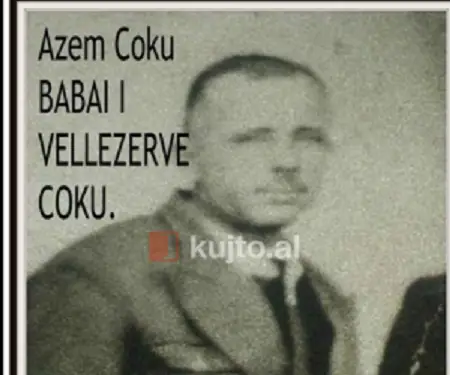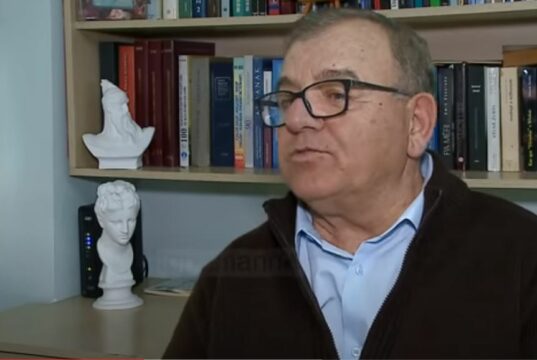Dashnor Kaloçi
Memorie.al publishes the chilling testimonies of 79-year-old Agim Bejko, originally from Starova in Pogradec and living in Paris, who tells the whole story of the Spaç Revolt, which took place on May 21, 22 and 23, 1973, where about The 1000 prisoners of that camp rose in a revolt against the prison command and the communist regime of that time, chanting political slogans such as: “Down with the dictatorship”, “We are not slaves”, “Here is death, here is freedom”, “You are murderers, you have painted your hands with our blood”, “Long live free Europe”, “Down with the communists”, “We will burn you like Stalin”, “The people are with us and are against you”, etc. All the details of how his brother, 27-year-old Dervish Bejko, was executed along with four friends; Hajri Pashaj, Pal Zefi and Skender Daja and the long ordeal of over 25 years of Agim Bejko in some districts of the country, in hills, mountains, streams and valleys, to find their bones …?!
“At the head of the revolt were these four; Dervish Bejko, Hajri Pashai, Pal Zefi and Skender Daja, who were the main initiators of that revolt, but there were other well-known names who later became legends of the political prisons of the communist regime, such as; Bedri Çoku, Gjet Kadeli, Demir Pojani, Dashnor Kazazi, Syrja Lamçe, Paulin Vata, Jorgo Papa, Luan Koka, Sami Dangëllia, Luan Burimi, and Hodo Sokoli. There have been many others, that I do not remember now and I do not want to make a classification, as that thing is already well known. So in the first moments of the revolt, my brother, Dervishi, tore the red piece of the bed and took Mersin Vlash, to paint the eagle. After he wanted to make the national flag, but without the red communist star. After Mersin painted the starless eagle, Dervishi took the flag and went to the third floor of the prison. This flag lived for three days and three nights, from May 21 to 23 “.
This is what 79-year-old Agim Bejko, originally from Starova in Pogradec and living in Paris for years, says for Memorie.al, which proves one of the most special stories of the camps and prisons of the communist regime of Enver Hoxha, that of The ‘Spaç Revolt’ of 1973, where one of the four executed was his brother, Dervish Bejko, then only 27 years old. Regarding the events of the Spaç revolt, as well as the many vicissitudes and the long ordeal of almost three decades of Agim Bejko in search of finding the remains of his brother, Dervish, and his three accomplices: Pal Zefi, Hajri Pashaj and Skënder Daja, etc., events never published before, we will get to know through this interview, starting with the Bejko family, known during the communist regime of Enver Hoxha, as one of the “most reactionary families” of Starova of Pogradec .
God, Agim, before we go to the event of the Spaç revolt, can you briefly tell us what was the past of your family?
We are originally from Starova of Pogradec and we were a big and relatively rich family at that time. Based on this fact, my grandfather finished his studies in Vienna, Austria, for the ‘low current’ cycle and had a university classmate, the famous engineer, Ndoc Naraçi from Shkodra, who later became a minister in the period of Zog Monarchy. After returning to Albania and starting work as an engineer, he implemented a project that had to do with the establishment of the first telephone line in Albania, from the north to Mallakaster. At that time in Mallakastër the war broke out and that project was stopped. The infamous reform of 1946 affected us, like everyone else, our family.
What happened to your family after the communists came to power in 1945?
The communist regime, which came to power in 1945, seized everything we had. They took them all from us and left us with only 3 acres of land. The house we had on 2 floors was turned into a school. The grandfather died and left two sons; my father, Enver and my uncle. In July 1945, his father, Enver, was arrested and sentenced to 12 years in prison for “agitation and propaganda”. Then, as was the custom of the communists, persecution and the long ordeal of suffering fell upon us. This was not enough, but they deported us, removed us from the house and we had no right to return there. By order of the State Security, they took us to a kitchen, or a hut I mean better, of one of our cousins. We were 8 children, grandmother nine, and mother ten. We lived in a very small environment that could not live, it was completely uninhabitable.
Remember that time, how old were you?
I remember him very well, because I was 13 years old at that time and the eldest son of the family, since I was born in 1942. When my father was in prison, I went to meet him in Korça prison and since I was children, my father told me: “I left a man at home”. Think a 13 year old, he was a house man. From the difficult conditions where my family lives, where they took us after they took us out of our house, I and two brothers have died, in the so-called kitchen, because it was not even the kitchen.
The two brothers who died, at what age were they?
One was 3 years old, Esat, while Salvation was 5 years old. It does not cross my mind, because at the time when Esat 3 years old died, the imam came to wash his brother and I, with a yellow kettle, poured water on the imam. I poured water on the imam to wash the corpse, and more tears fell on his brother’s body than water. We as a family were in total isolation and no one entered our house, as if we had leprosy …?! Absolutely no one came to us. Think what a terrible situation it has been for our family. After that the other brother also died, as we were in a miserable condition. We lived in very bad condition, as to keep our breath alive, we gained only 7 kg. corn from the People’s Council of the village, which we received at the Pogradec Collection. And only with these 7 kg. corn, we lived for a month the whole family.
What about the other age difference with your other brother, Dervish?
Dervishi has a difference from me of 4 years. He is born in 1946, while I am from 1942. Dervishi at this time was a small juvenile. The father, after being sentenced to 12 years in prison, for the work he did in prison, was caught by 3 amnesties and won 4 years, he was released from prison after 8 years. Even our closest people all left, except for the grooms we had very close to. We had a total isolation from the village. During the period that Dad came out of prison, we thought the ordeal of our suffering was over. But we were wrong, even seriously …?!
Why… ?!
Because there was no end to the ordeal, because the year 1971 was coming. At this time I grew up, working on a farm, (Agricultural Enterprise), because I had two roads; o on the farm o in the mine ?! By the time Dad was released, with a lot of effort, we were able to make on our own land, a building we could put our heads inside. But in 1971, the villager, Dervish, was arrested and sentenced to 12 years in prison on charges of “agitation and propaganda and attempted escape”.
Where was Dervishi when he was arrested?
The brother, Dervishi, at that time was working in Elbasan, in Metallurgy. After he got married, he broke away from his family in a way to lose track, because the shadow of persecution, or as it was said at the time “declassed”, followed from everywhere. But the family of the girl that Dervishi had taken for a wife, had a better biography than us and to save her, he separated from us and fled to Elbasan. At the time of his arrest, Dervishi also had a child, a son, Leonard Bacon. He had an only son who left him a year old. So, in 1971 he was arrested in Elbasan, the investigator did and did for 6 months.
During the time Dervishi was arrested, did your family ever meet him?
I once went with my father to meet him, after the investigation was over, but he had not yet appeared in court. We had some food to bring. I will never forget that day, because there in the Elabasan prison, in the yard of the Internal Affairs Branch, we happened to or deliberately came face to face with the red executioner, the head of the Branch, Nevzat Haznedari, who had a body in tall. He recognized his father and said: “Didn’t you remember, are you bringing the boys here too? “Here you will all die.”
How did the father respond?
Nor did he dare to speak, and they did not let us meet the brother, nor did they hold our food. So we went back home, because he had to go to court, get the sentence, and then you could meet him. After three weeks, Dervishi appeared in court, and as the trials were doing at the time, he was convicted with three witnesses, which his brother had not even admitted to the investigator. Even today there is the document in his file without signing it, that these were people that the State Security had introduced there, ie false witnesses and he did not know them at all. Yet he was sentenced to 12 years, the same as his father. Two articles caught him; agitation and propaganda and attempted escape. But none of them stood and those accusations were not true at all, that if it were true, he would have escaped when we were in Pogradec, that we were close to the border, not from Elbasan! The problem was that the Security spies of that time, the lackeys, the people who had sold their souls to the devil, how to say, had done the task entrusted to them… ?!
More specifically, how did it happen?
A State Security Operational Officer from Pogradec who was on duty in Elbasan, knew very well, not only Dervishi, but also the origin of our family, as well as the fact that we had our father and grandfather in prison. So he suggested that my brother be arrested. And after the sentence, he ended up in Spaç prison, where what happened with the Spaç Revolt of May 1973 happened.
According to what you have learned, what was that revolt and how did Dervishi get involved in it?
As a start I wanted to say that at the time the revolt broke out, Dervishi had spent almost two years in prison and as it were he knew in detail everything that was happening there. So in a word, he was acclimatized and was aware of everything, or rather, of every action he could take. Now let me come to your question, what was the Spac Revolt? In my opinion, the ‘Spaç revolt’ has been the accumulation of suffering, torture, forced labor of political prisoners. The slavery revolted against Spaç, because in fact, the rule for the prisoners was that they had to work 8 hours, but there was much more work …?! That they kept them for two hours before entering the gallery, and that they kept them for another two hours making the appeal, and so from 12, it went to 14 hours. This accumulation of suffering and years erupted in those moments. Thus, one day, on May 21, 1973, at 6:20 a.m., on the terrace of the camp buildings, the internal guards were tripled.
What happened after that?
After that, all the prisoners started to get nervous. At this time, the guards, police and soldiers of the internal and external siege, started cursing and provoking the prisoners, because they had come out in defense of their four fellow prisoners, who had been unjustly placed in isolation by the command in biruca. A prisoner there, it seems to me Pavlo Popa from Shkodra, took the lever and blew up the dungeons and so the four prisoners joined the other comrades, where there were almost 1000 people.
What happened after that?
Immediately revolt erupted like a volcano and everything was about bad economic conditions, hard work, torture and offensive words. You have to keep in mind that if a prisoner did not do the norm, he was tied up with barbed wire and handcuffs, beaten and he was forced to return to work to finish the norm. Prisoners mined pyrite, copper, and chrome. As the revolt began, the guards inside left their hats and confronted the prisoners like gladiators, but not exactly, because gladiators are on equal terms, while these were not. Keep in mind that the prisoners had neither weapons nor anything but an internal revolt, which further strengthened the ideals that everyone had in mind. While the effective officers and soldiers of that camp, were armed with guns, rubber truncheons and shovel tails.
Were there organizers of that revolt, that is, special names that came out on top of it?
Of course there were organizers, but at the head of the revolt, among the most active were these four; Dervish Bejko, Hajri Pashai, Pal Zefi and Skëender Daja. These were the main initiators of that revolt, but there were others; well-known names that later became legends of the political prisons of the communist regime, such as Bedri Çoku, Gjet Kadeli, Demir Pojani, Dashnor Kazazi, Syrja Lamçe, Paulin Vata, Jorgo Papa, Luan Koka, Sami Dangëllia, Luan Burimi, and Hodo Falcons. There have been many others, that I do not remember now and I do not want to make a classification, as that thing is already well known.
Let’s go back to the role of your brother, Dervish, in that revolt!
In the first moments of the revolt, my brother, Dervishi, tore the red piece of the bed and took Mersin Vlash to paint the eagle. After he wanted to make the national flag, but without the communist star. After Mersin painted the starless eagle, Dervishi took the flag and went to the third floor of the prison. This flag lasted three days and three nights, from May 21 to May 23. For three days, that flag was waved in the building of the Spaç camp. After these things happened, the camp was surrounded by barbed wire, three hoops, armored vehicles, sampists, and even helicopters flying over the prisoners’ heads. While the revolt was boiling, from the guards and the armed soldiers to the teeth, there were shots in the air and these became more frequent, especially when the prisoners shouted and chanted slogans, such as: “Here is death, here is freedom”, “Down with communism”. Down with dictatorship “,” We are not slaves “,” Here is death, here is freedom “,” You are murderers, you have painted your hands with our blood “,” Long live free Europe “,” Down with communists “,” We will burn you like Stalin “,” The people are with us and are against you “. What was happening there was quite unusual for the regime of that time, as it had never happened before since 1944 that that regime had come to power. And in these contexts, it was a shock from the foundations of the red communist dictatorship. This is quite true, because years later we learned that the event was talked about and written in foreign media./Memorie.al
Continues in the next issue




